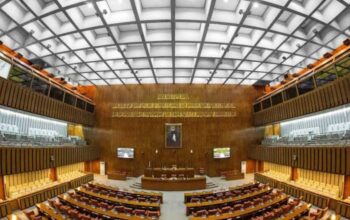By Staff Reporter
ISLAMABAD: A parliamentary panel on Saturday pressed the government to abandon proposed provisions in the Finance Bill 2025 that would empower tax officials to arrest individuals and issue money laundering notices, cautioning that such authority risks misuse and could stifle businesses.
The Senate Standing Committee on Finance and Revenue, chaired by Senator Saleem Mandviwalla, convened for a second straight day to scrutinise the legislation. The panel debated the Federal Board of Revenue’s (FBR) expanded powers alongside proposed customs reforms and penalties for tampered vehicles.
Mandviwalla warned of the “grave risk of misuse,” arguing that even notices from junior FBR officers could disrupt business operations. “A money laundering notice often shuts down a business,” he said. “Such notices should require the express permission of the FBR chairman and the finance minister.”
Opposition Pakistan Tahreek-e-Insaf party Senator Shibli Faraz called the proposal a dangerous overreach. “This extension of power to tax commissioners is turning Pakistan into a police state,” Faraz said “Even taxpayers will flee.”
Coalition partner Pakistan Peoples Party’s Senator Farooq H. Naek zeroed in on the practical fallout for the business community, emphasising that money laundering notices carry weighty implications. “They can cripple a businessman’s ability to import or export,” he told the FBR, urging officials to reconsider the provision’s impact.
Finance Minister Muhammad Aurangzeb, present at the meeting, acknowledged the senators’ apprehensions. “Money laundering notices are indeed a very serious matter and should be reviewed carefully under this provision,” he said.
The Pakistan Business Council has also objected, appealing to the prime minister to reconsider granting FBR officials such sweeping authority.
FBR Chairman Rashid Mahmood Langrial defended the measures, asserting that tax officials already possess arrest powers and that the bill merely clarifies procedures. “The process has been further streamlined,” he said, seeking to reassure the committee that the measures are not a radical departure from existing practice.
PTI’s Faraz, however, remained unconvinced, arguing it could alienate taxpayers.
The panel also examined amendments to the Customs Act, 1969. A new digital Cargo Tracking System aims to curb smuggling, while imports via post or courier under Rs5,000 would be duty-free. The de minimis limit for courier parcels would drop to Rs500 to prevent exploitation.
Tough rules targeting tampered vehicles gained approval. Under the proposed law, any vehicle with a tampered chassis number, cut-and-weld modifications, or re-stamped identification will be presumed smuggled—regardless of its registration status.
“Such vehicles will not be auctioned again. In principle, these vehicles should be scrapped to prevent the resale of parts,” Langrial said. The committee went further, recommending that confiscation and destruction occur within 30 days of seizure.
Langrial also highlighted the country’s stark wealth divide, noting that 5 percent of the population holds most riches, with the top 1 percent averaging Rs10 million annually.
“Just 5 percent of the population controls most of the country’s wealth… Ninety-five percent cannot afford to pay taxes,” he said.
FBR chairman said only 6 million people are registered tax filers, while 132 million, those under 18 or senior citizens, fall outside the labor force. Another 67 million are unemployed, including a significant number of educated women.
Langrial argued that the focus must shift “from expanding the tax net to taxing the rich effectively.”
Langrial said the International Monetary Fund (IMF) has directed Pakistan to raise Rs701 billion through new tax measures in fiscal 2026.
The FBR targets Rs500 billion via enforcement, though the IMF lowered this to Rs389 billion. He cited underreported tax collection in sugar and cotton, adding that tobacco production monitoring will tighten from July 1.
Langrial noted that improved enforcement has already yielded significant gains in tax collection. Yet, he acknowledged the constraints. “The government of Pakistan has to obtain approval from the IMF for every tax-related proposal,” including exemptions, rate reductions, or regime changes.
Copyright © 2021 Independent Pakistan | All rights reserved




